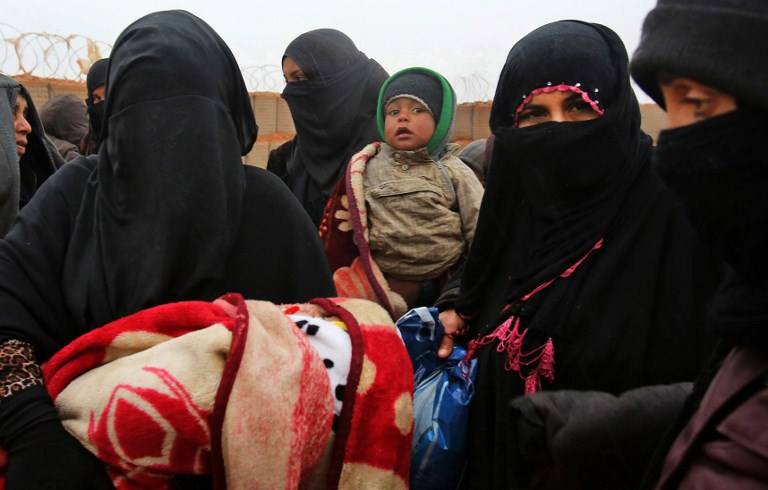(Zaman Al Wasl)- Nora (pseudonym), who took shelter in a desert camp for displaced people along the Syria-Jordan border, was surprised by signs of labor last February, but due to the lack of any medical services, she soon died with her fetus, while waiting for any ambulance or any medical aid to reached her.
Activists reported that the deceased woman was, then, suffering from a drought and a lack of blood before dying. 7 pregnant women died in 2018 due to delays in providing them with assistance in Rukban camp, activists say.
The Rukban camp, that lies along the demilitarized berm between Jordan and Syria, is a completely arid remote area inhabited by 75,000 Syrian refugees since 2014.
This case is one of the several cases of pregnant women. For them, giving birth, has turned into a fatal event, which is recurrent in a forgotten camp, which lacks the necessary medical facilities. The camp has more than 55,000 people, but it has few nurses and a number of volunteers who had a month-lonnursing training course at a nearby US military base.
The most current and growing concern among the medical staff working in the Rukban is the diseases affecting children, not to mention the dozens of cesarean sections that require doctors, medical supplies and medicines that are not available in any of the medical centers located in Rukban camp.
Imad Ghali, media activist, told Zaman al-Wasl that only three midwives are operating in Rukban camp, one of them has legal certificate. Birth and reproduction in the camp is difficult and dangerous.
Ghali, who lives in the camp, said that medical staff in the camp are often unable to assist pregnant women, because of the lack of resources and expertise. Pregnant women in labor are sometimes admitted to the Jordanian territory, or to the Jordanian medical aid points. This has been done, usually, for about seven months, but recently, he says, these cases have been refused admission to Jordan for unknown reasons.
Ghali explained that the activists of the isolated camp, appealed several times to the concerned parties with the refugees, the UN, and UNICEF the responsible of the point "Aoun" for medical assistance to births, highlighting the negligence, but it was in vain. There are 200 medical cases requiring rapid and immediate entry into Jordan, including births and women requiring caesarean sections.

According to Ghali, the rate of births in the camp, in medical points, including Cham Medical and Noor medical point, estimated 5 births per day, mostly natural births. Other cases requiring caesarean section, in which the family of pregnant women are forced to send her to the areas of the regime’s control, where she gets arrested, as It is not allowed to enter. In case she was transferred inside Jordan, it takes a long time to receive approval from the Jordanian side and approval of UNICEF, which worsen the situation for these pregnant women.
Some 5.6 million Syrian refugees remain in neighboring countries – Turkey, Lebanon, Jordan, Egypt and Iraq – Amin Awad, UNHCR director for the Middle East and North Africa. Some 37,000 have returned this year, UNHCR figures show.
Dr. Mohamed Taha, director of ‘La Maison de Palmyra’, said the situation of pregnant woman is considered one of the biggest concerns facing the women and their families in the camp. Since the seventh month of pregnancy, the fear and anticipation of the pregnant family rises.
Frightened of the day that is supposed to be the most beautiful of the family days. Fear for the mother who carried her fetus without any adequate nutrition. Fear for the fetus from the birth conditions, and the absence of health care, at the moment of birth.
Taha describing the situation of the father, who is forced to move between the closed borders of the UNICEF medical point, as if it was the borders of a European country, and the other points of private medical points, if we may you call it medical, to inquire about costs, and start a search for somebody to help covering the costs, or part of it. Even if the costs are being taken care of, the fear remains - he said - of the day of labor, it would be either a new birth, half birth, or death of either mother or fetus and perhaps both, as what happened in the case of the woman who died last year because of neglect.
Since the Syrian revolution erupted in 2011, more than 560,000 people have been killed, and more than 6 million people have been displaced.
Zaman Al Wasl
















Comments About This Article
Please fill the fields below.